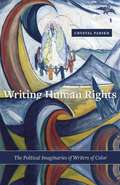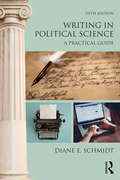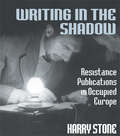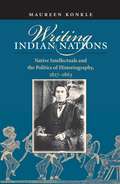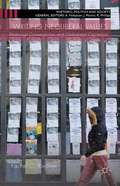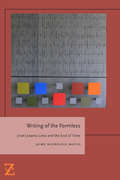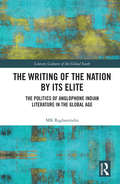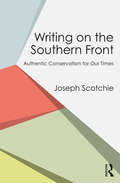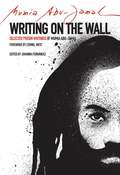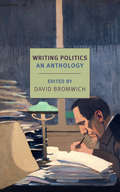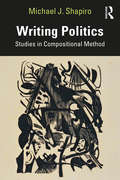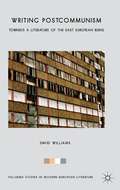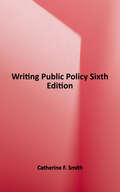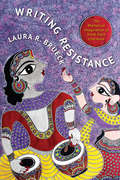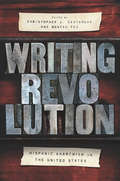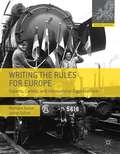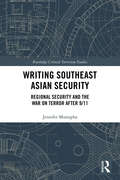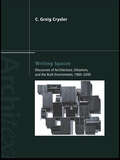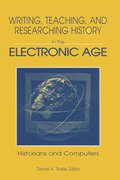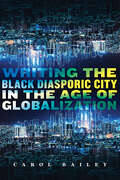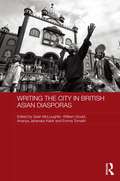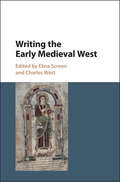- Table View
- List View
Writing Human Rights: The Political Imaginaries of Writers of Color
by Crystal ParikhThe legal texts and aspirational ideals of human rights are usually understood and applied in a global context with little bearing on the legal discourse, domestic political struggles, or social justice concerns within the United States. In Writing Human Rights, Crystal Parikh uses the international human rights regime to read works by contemporary American writers of color—Toni Morrison, Chang-rae Lee, Ana Castillo, Aimee Phan, and others—to explore the conditions under which new norms, more capacious formulations of rights, and alternative kinds of political communities emerge.Parikh contends that unlike humanitarianism, which views its objects as victims, human rights provide avenues for the creation of political subjects. Pairing the ethical deliberations in such works as Beloved and A Gesture Life with human rights texts like the United Nations Convention Against Torture, she considers why principles articulated as rights in international conventions and treaties—such as the right to self-determination or the right to family—are too often disregarded at home. Human rights concepts instead provide writers of color with a deeply meaningful method for political and moral imagining in their literature.Affiliating transnational works of American literature with decolonization, socialist, and other political struggles in the global south, this book illuminates a human rights critique of idealized American rights and freedoms that have been globalized in the twenty-first century. In the absence of domestic human rights enforcement, these literatures provide a considerable repository for those ways of life and subjects of rights made otherwise impossible in the present antidemocratic moment.
Writing in Political Science: A Practical Guide
by Diane E. SchmidtA complete, professional resource for writing an effective paper in all subfields of political science, Diane Schmidt’s 25th anniversary edition provides students with a practical, easy-to-follow guide for writing about political ideas, events, policies, passions, agendas, and processes. It offers additional formats and guidelines focusing on the growing use of social media and the need for professional communication in blogs, tweets, forums, media sites, lectures on demand, and postings on websites. A collection of student papers shows students how to write well for better grades. After reading Writing in Political Science students will know how to: choose and narrow a research topic; formulate a research agenda; quickly locate reputable information online; execute a study and write up findings; use the vocabulary of political science discourse; follow the criteria used to evaluate student assignments when writing; apply writing skills to an internship, civic engagement project, or grant proposal; and manage and preserve achievements for career development. New to the Fifth Edition Locating Research Materials: Updated links to all sources, expansion of appropriate sources to include mobile sources available through tweets, blogs, forums, and other informal communication; expansion of tools to include database searching; use of smart phone technology; and evaluation of source reliability to include commercial sources, Wikipedia, media sites, social media, and lectures on demand. Creating Evidence: Evaluating data sources on the web including government databases, non-profits, and special interest/commercial data; and using collaborative forms of data collection. Includes a new section on Memorandums of Conversations (MEMCON), essential in recent political controversies. Manuscript Formatting and Reference Styles: Updated examples of citing internet sites, blogs, forums, lectures on demand, and YouTube. Format/Examples: Updated exam-writing treatment to include on-line, e-learning, open-book exams, media applications examples using YouTube and online media; restored legal briefs treatment; revised proposal examples; revised PowerPoint instructions to include diversity considerations; expanded formula for standard research papers to include wider disciplinary treatment, expanded communication techniques, format and examples of appropriate posting for social media and organizational websites, expanded internship treatment, inclusion of needs-assessment format and examples. Career Development: Restoration of 3rd edition chapter and expansion of professional portfolio building including vitae, resume, cover letters, letters of intent, statement of purpose, and skills/competency discussions. Updated citations for changes in The Chicago Manual of Style, 17th Edition, 2017 and The MLA Handbook for Writers of Research Papers, 8th Edition, 2016.
Writing in the Shadow: Resistance Publications in Occupied Europe
by Harry StoneThe first complete national and international survey in the English language of the clandestine newspapers and books published in the occupied countries of Europe during the Second World War.A man with earphones crouching in the attic listening in with a crystal set, a prisoner writing fearfully even in the condemned cell, youths taking courses in weightlifting so as to be able to carry cases of lead type with apparent ease: these are just some of the people who helped produce clandestine newspapers and books in the occupied countries of Europe during the Second World War. Writing in the Shadow describes the risks these people ran and the ingenuity and brilliant improvisation they used to hoodwink the Nazis and distribute newsletters to tens of thousands of people.
Writing Indian Nations
by Maureen KonkleIn the early years of the republic, the United States government negotiated with Indian nations because it could not afford protracted wars politically, militarily, or economically. Maureen Konkle argues that by depending on treaties, which rest on the equal standing of all signatories, Europeans in North America institutionalized a paradox: the very documents through which they sought to dispossess Native peoples in fact conceded Native autonomy. As the United States used coerced treaties to remove Native peoples from their lands, a group of Cherokee, Pequot, Ojibwe, Tuscarora, and Seneca writers spoke out. With history, polemic, and personal narrative these writers countered widespread misrepresentations about Native peoples' supposedly primitive nature, their inherent inability to form governments, and their impending disappearance. Furthermore, they contended that arguments about racial difference merely justified oppression and dispossession; deriding these arguments as willful attempts to evade the true meanings and implications of the treaties, the writers insisted on recognition of Native peoples' political autonomy and human equality. Konkle demonstrates that these struggles over the meaning of U.S.-Native treaties in the early nineteenth century led to the emergence of the first substantial body of Native writing in English and, as she shows, the effects of the struggle over the political status of Native peoples remain embedded in contemporary scholarship.
Writing Neoliberal Values: Rhetorical Connectivities and Globalized Capitalism (Rhetoric, Politics and Society)
by Rachel C. RiednerThis book examines human-interest stories, unpacking from them violence inherent to neoliberalism, and considers if it is possible to find in these stories hints of people and labour that suggest other narratives.
Writing Neoliberal Values: Rhetorical Connectivities and Globalized Capitalism (Rhetoric, Politics and Society)
by Rachel C. RiednerThis book examines human-interest stories, unpacking from them violence inherent to neoliberalism, and considers if it is possible to find in these stories hints of people and labour that suggest other narratives.
Writing of the Formless: Jose Lezama Lima and the End of Time
by Jaime Rodríguez MatosIn this book, Jaime Rodríguez Matos proposes the “formless” as a point of departure in thinking through the relationship between politics and time. Thinking through both literary and political writings around the Cuban Revolution, Rodríguez Matos explores the link between abstract symbolic procedures and various political experiments that have sought to give form to a principle of sovereignty based on the category of representation. In doing so, he proposes the formless as the limit of modern and contemporary reflections on the meaning of politics while exploring the philosophical consequences of a formless concept of temporality for the critique of metaphysics. Rodríguez Matos takes the writing and thought of José Lezama Lima as the guiding thread in exploring the possibility of a politicity in which time is imagined beyond the disciplining functions it has had throughout the metaphysical tradition—a time of the absence of time, in which the absence of time no longer means eternity.
The Writing of the Nation by Its Elite: The Politics of Anglophone Indian Literature in the Global Age (Literary Cultures of the Global South)
by MK RaghavendraThis volume examines the idea of India as it emerges in the writing of its anglophone elite, post-2000. Drawing on a variety of genres, including fiction, histories, non-fiction assessments – economic, political, and business – travel accounts, and so on, this book maps the explosion of English-language writing in India after the economic liberalization and points to the nation’s sense of its growing importance as a producer of culture. From Ramachandra Guha to William Dalrymple, from Arundhati Roy to Pankaj Mishra, from Jhumpa Lahiri to Amitav Ghosh, from Amartya Sen to Gurcharan Das, from Barkha Dutt to Tarun Tejpal, this investigation takes us from aesthetic imaginings of the nation to its fractured political fault lines, the ideological predispositions of the writers often pointing to an asymmetrically constituted India. A major intervention on how postcolonial India is written about and imagined in the anglophone world, this book will be of great interest to scholars and researchers of cultural studies, literature, history, and South Asian studies. It will also be of interest to general readers with an inclination towards India and Indian writing.
Writing on the Southern Front: Authentic Conservatism for Our Times
by Joseph ScotchieFor traditionalists, the conservative ascendency of the 1980s turned out to be a major disappointment. With the triumph of multiculturalism and political correctness, liberalism seemed to move from strength to strength. Still, a stout number of southern conservative writers plunged forward, and their themes of populism, immigration, and cultural integrity are seeing a contemporary resurgence. Discussing a wide array of authors who worked in a variety of genres, Joseph Scotchie celebrates those unreconstructed champions who fought the culture wars of their times with a special learning and vigor. Also included in this collection are creative artists who kept the flame of literature alive, providing visions of possibilities that only genre can provide.
Writing on the Wall
by Mumia Abu Jamal Johanna Fernandez"Revolutionary love, revolutionary memory and revolutionary analysis are at work in every page written by Mumia Abu-Jamal ... His writings are a wake-up call. He is a voice from our prophetic tradition, speaking to us here, now, lovingly, urgently. Black man, old-school jazz man, freedom fighter, revolutionary-his presence, his voice, his words are the writing on the wall."-Cornel West, from the forewordFrom the first slave writings to contemporary hip hop, the canon of African American literature offers a powerful counter-narrative to dominant notions of American culture, history and politics. Resonant with voices of prophecy and resistance, the African American literary tradition runs deep with emancipatory currents that have had an indelible impact on the United States and the world. Mumia Abu-Jamal has been one of our most important contributors to this canon for decades, writing from the confines of the U.S. prison system to give voice to those most silenced by chronic racism, impoverishment and injustice.Writing on the Wall is a selection of more than 100 previously unpublished essays that deliver Mumia Abu-Jamal's essential perspectives on community, politics, power, and the possibilities of social change in the United States. From Rosa Parks to Edward Snowden, from the Trail of Tears to Ferguson, Missouri, Abu-Jamal addresses a sweeping range of contemporary and historical issues. Written mostly during his years of solitary confinement on Death Row, these essays are a testament to Abu-Jamal's often prescient insight, and his revolutionary perspective brims with hope, encouragement and profound faith in the possibility of redemption."Greatness meets us in this book, and not just in Mumia's personal courage and character. It's in the writing. This is art with political power, challenging institutional injustice in the U.S. while catalyzing our understanding, memory and solidarities for liberation and love. Writing on the Wall can set the nation aflame-yes, for creating new possible worlds."-Mark Lewis Taylor, Professor of Theology and Culture, Princeton Theological SeminaryMumia Abu-Jamal is an award-winning journalist and author of two best-selling books, Live From Death Row and Death Blossoms.Johanna Fernández is a Fulbright Scholar and Professor of History at Baruch College in New York City.Cornel West is a scholar, philosopher, activist and author of over a dozen books including his bestseller, Race Matters. He appears frequently in the media, and has appeared on Real Time with Bill Maher, The Colbert Report, CNN and C-Span as well as Tavis Smiley. Baruch College of the City University of New York where she teaches 20th Century US history and African American History. She is author of the forthcoming When the World Was Their Stage: A History of the Young Lords Party, 1968-1976 (Princeton University Press). Fernandez is the writer and producer of the film, Justice on Trial: the Case of Mumia Abu-Jamal and she is featured in the critically acclaimed documentary about Mumia Abu-Jamal, Long Distance Revolutionary. She has appeared in Democracy Now!, Hannity, Megyn Kelley, Al Jazeera, and The New York Times. She is a coordinator of the Campaign to Bring Mumia Home.CORNEL WEST is a scholar, philosopher, activist and author of over a dozen books including his bestseller, Race Matters.
Writing Politics: An Anthology
by David BromwichExplore the tradition of the political essay with this brilliant anthology.David Bromwich is one of the most well-informed, cogent, and morally uncompromising political writers on the left today. He is also one of our finest intellectual historians and literary critics. In Writing Politics, Bromwich presents twenty-seven essays by different writers from the beginning of the modern political world in the seventeenth century until recent times, essays that grapple with issues that continue to shape history—revolution and war, racism, women&’s rights, the status of the worker, the nature of citizenship, imperialism, violence and nonviolence, among them—and essays that have also been chosen as superlative examples of the power of written English to reshape our thoughts and the world. Jonathan Swift, Edmund Burke, Henry David Thoreau, Harriet Taylor, Abraham Lincoln, George Eliot, W. E. B. Du Bois, Mohandas Gandhi, Virginia Woolf, Martin Luther King, and Hannah Arendt are here, among others, along with a wide-ranging introduction.
Writing Politics: Studies in Compositional Method
by Michael J ShapiroWriting Politics is a methods book designed to instruct on politically focused literary inquiry. Exploring the political sensibilities that arise from the way literary fiction re-textualizes historical periods and events, the book features a series of violence-themed inquiries that emphasize forms of writing as the vehicles for politically attuned historiography. Each investigation treats the way the literary genre, within historiographic metafiction, enables political inquiry. It’s a form of writing that inter-articulates history and fiction to rework a textual past and unsettle dominant understandings of events and situations. Central to the diverse chapters are fictional treatments of authoritarian, fascist, or zealous mentalities. Featured, for example, are Radovan Karadzic (the architect of the Bosnian genocide), Reinhard Heydrich (the architect of the Holocaust’s "final solution"), and the Trotsky assassin Ramon Mercader. Michael J. Shapiro has produced another original and sophisticated bookshelf staple; the only contemporary investigation in Political Studies that instructs on method in this way.
Writing Postcommunism
by David WilliamsMoving through the elegiac ruins of the Berlin Wall and the Yugoslav disintegration, Writing Postcommunism explores literary evocations of the pervasive disappointment and mourning that have marked the postcommunist twilight.
Writing Public Policy: A Practical Guide to Communicating in the Policymaking Process
by Catherine F. SmithWriting Public Policy is a practical, concise guide to writing and communicating in public policy processes. Designed to help students understand and perform common types of communication used in solving public problems, this text explains the standards and functions of communicating in the public sector and teaches the use of selected public policy communication genres. Catherine F. Smith presents a general method for planning, producing, and assessing communications in a variety of real-life contexts and situations of public policy work.
Writing Resistance: The Rhetorical Imagination of Hindi Dalit Literature (South Asia Across the Disciplines)
by Laura BrueckWriting Resistance is the first close study of the growing body of contemporary Hindi-language Dalit (low caste) literature in India. The Dalit literary movement has had an immense sociopolitical and literary impact on various Indian linguistic regions, yet few scholars have attempted to situate the form within contemporary critical frameworks. Laura R. Brueck's approach goes beyond recognizing and celebrating the subaltern speaking, emphasizing the sociopolitical perspectives and literary strategies of a range of contemporary Dalit writers working in Hindi.Brueck explores several essential questions: what makes Dalit literature Dalit? What makes it good? Why is this genre important, and where does it oppose or intersect with other bodies of Indian literature? She follows the debate among Dalit writers as they establish a specifically Dalit literary critical approach, underscoring the significance of the Dalit literary sphere as a "counterpublic" generating contemporary Dalit social and political identities. Brueck then performs close readings of contemporary Hindi Dalit literary prose narratives, focusing on the aesthetic and stylistic strategies deployed by writers whose class, gender, and geographic backgrounds shape their distinct voices. By reading Dalit literature as literature, this study unravels the complexities of its sociopolitical and identity-based origins.
Writing Revolution: Hispanic Anarchism in the United States
by Christopher J. Castañeda Montse FeuIn the late nineteenth through mid-twentieth centuries, the anarchist effort to promote free thought, individual liberty, and social equality relied upon an international Spanish-language print network. These channels for journalism and literature promoted anarchist ideas and practices while fostering transnational solidarity and activism from Buenos Aires to Los Angeles to Barcelona. Christopher J. Castañeda and Montse Feu edit a collection that examines many facets of Spanish-language anarchist history. Arranged chronologically and thematically, the essays investigate anarchist print culture's transatlantic origins; Latina/o labor-oriented anarchism in the United States; the anarchist print presence in locales like Mexico's borderlands and Steubenville, Ohio; the history of essential publications and the individuals behind them; and the circulation of anarchist writing from the Spanish-American War to the twenty-first century.Contributors: Jon Bekken, Christopher Castañeda, Jesse Cohn, Sergio Sánchez Collantes, María José Domínguez, Antonio Herrería Fernández, Montse Feu, Sonia Hernández, Jorell A. Meléndez-Badillo, Javier Navarro Navarro, Michel Otayek, Mario Martín Revellado, Susana Sueiro Seoane, Kirwin R. Shaffer, Alejandro de la Torre, and David Watson
Writing The Rules For Europe: A Practical Guide To The Future
by Johan Schot Wolfram KaiserTechnologies have created crucial connections across borders requiring new forms of regulation. This book analyzes how experts, cartels and international organizations have written the rules for Europe since around 1850. Based on fresh research in the archives of multiple international organizations and European countries it explores the "hidden integration" of Europe forms of integration that were not always visible, but affected the citizens of Europe in their everyday lives. Richly illustrated and engagingly written, the book de-centers the present-day European Union in a new long-term understanding of European integration. "
Writing Southeast Asian Security: Regional Security and the War on Terror after 9/11 (Routledge Critical Terrorism Studies)
by Jennifer MustaphaThis book is a critical analysis of how the discursive and material practices of the "War on Terror" influenced security politics in Southeast Asia after 9/11. It explores how the US-led War on Terror, operating both as a set of material practices and as a larger discursive framework for security, influenced the security of both state and non-state actors in Southeast Asia after 9/11. Building on the author’s own critical security studies approach, which demands a historically and geographically contingent method of empirically grounded critique, Writing Southeast Asian Security examines some of the unexpected effects that the discourses and practices of the War on Terror have had on the production of insecurity in the region. The cases presented here demonstrate that forms of insecurity were constructed and/or abetted by the War on Terror itself, and often occurred in concert with the practices of traditional state-centric security. This work thus contributes to a larger critical project of revealing the violence intrinsic to the pursuit of security by states, but also demonstrates pragmatic opportunities for a functioning politics of theorizing security. This book will be of much interest to students of critical terrorism studies, critical security studies, East Asian, and Southeast Asian politics, US foreign policy, and IR in general.
Writing Spaces: Discourses of Architecture, Urbanism and the Built Environment, 1960–2000 (Architext)
by C. Greig CryslerWriting Spaces examines some of the most important discourses in spatial theory of the last four decades, and considers their impact within the built environment disciplines. The book will be a key resource for courses on critical theory in architecture, urban studies and geography, at both the graduate and advanced undergraduate level.
Writing, Teaching and Researching History in the Electronic Age: Historians and Computers
by Dennis A. TrinkleThis volume focuses on the role of the computer and electronic technology in the discipline of history. It includes representative articles addressing H-Net, scholarly publication, on-line reviewing, enhanced lectures using the World Wide Web, and historical research.
Writing the 1926 General Strike
by Charles FerrallCharles Ferrall and Dougal McNeill's book analyses the vast literary response to the 1926 General Strike . The Strike not only drew writers into political action but inspired literature that served to shape twentieth-century British views of class, culture and politics. While major figures active at the time wrote on or responded to this crucial moment, this is the first volume to address their respective works. Ferrall and McNeill show how novels then in progress, such as Virginia Woolf's To the Lighthouse and D. H. Lawrence's Lady Chatterley's Lover, were affected by the Strike as well as the ways in which it has been remembered from the 1930s to the present. Their study sheds new light on the relationship between politics and literature of the modernist era.
Writing the Black Diasporic City in the Age of Globalization
by Carol BaileyWriting the Black Diasporic City in the Age of Globalization theorizes the city as a generative, “semicircular” social space, where the changes of globalization are most profoundly experienced. The fictive accounts analyzed here configure cities as spaces where movement is simultaneously restrictive and liberating, and where life prospects are at once promising and daunting. In their depictions of the urban experiences of peoples of African descent, writers and other creative artists offer a complex set of renditions of twentieth- and twenty-first-century Black urban citizens’ experience in European or Euro-dominated cities such as Boston, London, New York, and Toronto, as well as Global South cities such as Accra, Kingston, and Lagos—that emerged out of colonial domination, and which have emerged as hubs of current globalization. Writing the Black Diasporic City draws on critical tools of classical postcolonial studies as well as those of globalization studies to read works by Ama Ata Aidoo, Amma Darko, Marlon James, Cecil Foster, Zadie Smith, Michael Thomas, Chika Unigwe, and other contemporary writers. The book also engages the television series Call the Midwife, the Canada carnival celebration Caribana, and the film series Small Axe to show how cities are characterized as open, complicated spaces that are constantly shifting. Cities collapse boundaries, allowing for both haunting and healing, and they can sever the connection from kin and community, or create new connections.
Writing the City in British Asian Diasporas (Routledge Contemporary South Asia Series)
by William Gould Emma Tomalin Seán McLoughlin Ananya Jahanara KabirIn 1962, the Commonwealth Immigrants Act hastened the process of South Asian migration to postcolonial Britain. Half a decade later, now is an opportune moment to revisit the accumulated writing about the diasporas formed through subsequent settlement, and to probe the ways in which the South Asian diaspora can be re-conceptualised. Writing the City in British Asian Diasporas takes a fresh look at such matters and will have multi-disciplinary resonance worldwide. The meaning and importance of local, multi-local and trans-local dynamics is explored through a devolved and regionally-accented comparison of five British Asian cities: Bradford, the East End of London, Manchester, Leicester and Birmingham. Analysing the ‘writing’ of these differently configured cities since the 1960s, its main focus is the significant discrepancies in representation between differently-positioned texts reflecting both dominant institutional discourses and everyday lived experiences of a locality. Part I offers a comprehensive, yet still highly contested, reading of each city’s archives. Part II examines how the arts and humanities fields of History, Religion, Gender and Literary/Cultural Studies have all written British Asian diasporas, and how their perspectives might complement the better-established agendas of the social sciences. Providing an innovative analysis of South Asian communities and their multi-local identities in Britain today, this interdisciplinary book will be of interest to scholars of South Asian Studies, Migration, Ethnic and Diaspora Studies, as well as Sociology, Anthropology, and Geography.
Writing the Early Medieval West
by Charles West Elina ScreenFar from the oral society it was once assumed to have been, early medieval Europe was fundamentally shaped by the written word. This book offers a pioneering collection of fresh and innovative studies on a wide range of topics, each one representing cutting-edge scholarship, and collectively setting the field on a new footing. Concentrating on the role of writing in mediating early medieval knowledge of the past, on the importance of surviving manuscripts as clues to the circulation of ideas and political and cultural creativity, and on the role that texts of different kinds played both in supporting and in subverting established power relations, these essays represent a milestone in studies of the early medieval written word.
Writing the Monarch in Jacobean England
by Jane RickardKing James VI and I's extensive publications and the responses they met played a key role in the literary culture of Jacobean England. This book is the first sustained study of how James's subjects commented upon, appropriated and reworked these royal writings. Jane Rickard highlights the vitality of such responses across genres - including poetry, court masque, sermon, polemic and drama - and in the different media of performance, manuscript and print. The book focuses in particular on Jonson, Donne and Shakespeare, arguing that these major authors responded in illuminatingly contrasting ways to James's claims as an author-king, made especially creative uses of the opportunities that his publications afforded and helped to inspire some of what the King in turn wrote. Their literary responses reveal that royal writing enabled a significant reimagining of the relationship between ruler and ruled. This volume will interest researchers and advanced students of Renaissance literature and history.
